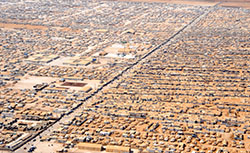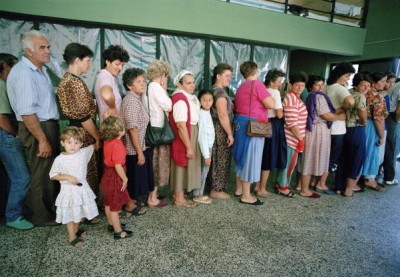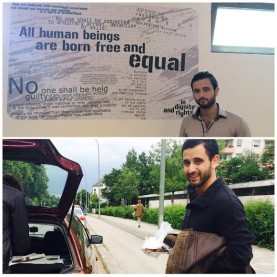
Migration
The Conservative party campaigned strongly with the promise to bring net migration numbers down in order to win the general election in May 2015. They achieved a majority vote and are now trying very hard to adhere to that promise.
The statistics show, however, that international migration is doing the exact opposite with a rise of 82,000 more people migrating to the UK as per November 2015 compared to 2014. Now, agreements with the EU can only impact the migration of EU nationals, but the figure has also risen here by 42,000 compared to 2014. Out of a net migration of 336,000 individuals, have 42,000 been coming from other EU Member States. Although this clearly shows how the matter of migration cannot be solved on an EU level, has migration made it to the list of things impacting on the UK’s EU referendum campaigns.
EU Citizenship
 Every national of every Member State of the European Union is automatically also a citizen of the European Union. The rights of every European Union citizen are established by the case law of the Court of Justice of the European Union and outlined by Article 21 of the Treaty on the Functioning of the European Union, briefly called and referred to as TFEU. The key aspect of this right is the free movement:
Every national of every Member State of the European Union is automatically also a citizen of the European Union. The rights of every European Union citizen are established by the case law of the Court of Justice of the European Union and outlined by Article 21 of the Treaty on the Functioning of the European Union, briefly called and referred to as TFEU. The key aspect of this right is the free movement:
1. Every citizen of the Union shall have the right to move and reside freely within the territory of the Member States, subject to the limitations and conditions laid down in the Treaties and by the measures adopted to give them effect
Once you set foot on the continent, you can leave your passport in your pocket and travel freely from Lisbon in Portugal to Riga in Latvia. Many UK nationals move abroad to sunnier places to enjoy their retirement there, as they will still receive their retirement funds and have access to the local healthcare supplier, wherever they are in the European Union. The outcome of the referendum and the negotiated new terms can have a huge impact on this right of European Union citizens.
Refugees
 An aerial view of the Za'atri Refugee Camp
The European Union is facing the biggest humanitarian crisis of the continent since World War II. Every day, thousands of people, fleeing their home country for reasons of war, health, persecution or instable economies are coming ashore of the European Union outer borders in Greece. While the majority of refugees, around 4.5 Million Syrians, according to Amnesty International, is hosted by just five nations (Turkey, Lebanon, Jordan, Iraq and Egypt), was the European Union, consisting of 28 Member States, struggling to cater for around 530.000 in 2015. Most of these have been applying for asylum in Germany, followed by Hungary and Sweden.
An aerial view of the Za'atri Refugee Camp
The European Union is facing the biggest humanitarian crisis of the continent since World War II. Every day, thousands of people, fleeing their home country for reasons of war, health, persecution or instable economies are coming ashore of the European Union outer borders in Greece. While the majority of refugees, around 4.5 Million Syrians, according to Amnesty International, is hosted by just five nations (Turkey, Lebanon, Jordan, Iraq and Egypt), was the European Union, consisting of 28 Member States, struggling to cater for around 530.000 in 2015. Most of these have been applying for asylum in Germany, followed by Hungary and Sweden.
The European Union is torn by discrepancies in the understanding of solidarity. While the UK is firm in supporting refugees financially, it is not open to debate when it comes to actually hosting refugees. The political argument strongly links to the promise of a lowering of net migration numbers. The humanitarian and moral argument is more difficult to support when an annual intake of 5.000 refugees till 2020 is what the UK promised.
The movement of refugees is impacting on the UK’s EU referendum, as the out-campaign toys with the fear of UK nationals that the EU will force a bigger intake of refugees, which will then be seen as negatively impacting on housing, healthcare, etc. The reality is that the EU is struggling to yet develop an effective relocation mechanism for refugees arriving in Greece. It is a politically sensitive topic, which expects 28 Heads of Government to agree on a policy that is fair for all, while the numbers they are agreeing and juggling are out of date by the time they are finding an agreement.
Once on European Union ground and registered, refugees can move around the Union. The basis for this is the Schengen agreement, which allows free movement between those states that signed the agreement for their nationals and those holding a valid visa or residency permit of other kind. What campaigners like to fail to point out is that the UK has in fact never signed the Schengen agreement and does consequently not belong to the Schengen area. Although a Member of the European Union, the UK can to an extent apply its very own asylum and visa policy.
Explore more about the EU referendum...
Study with The OU...
This article is part of an EU Referendum Hub. To find out more from the official 'leave' campaign visit 'Vote Leave' and to find out more from the official 'stay' campaign visit 'Britain Stronger In Europe'.
Please note: The opinions expressed in this hub are those of the individual authors, and do not represent the views of The Open University.









Rate and Review
Rate this article
Review this article
Log into OpenLearn to leave reviews and join in the conversation.
Article reviews